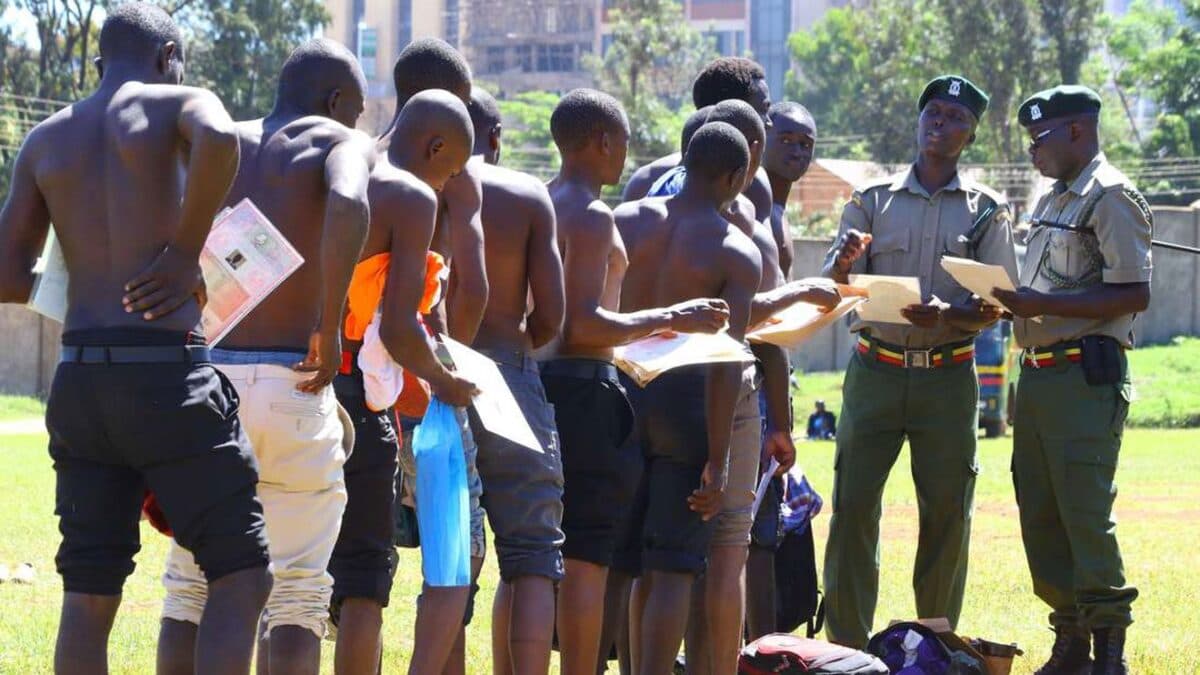We're loading the full news article for you. This includes the article content, images, author information, and related articles.
A 27-year-old man's eighth rejection from the National Police Service, despite reportedly meeting the minimum height, ignites a national conversation on the transparency and relevance of physical recruitment standards in Kenya.

For the eighth time in seven years, Idris Kiprop, a 27-year-old from Kaptimbor village in Baringo Central, saw his lifelong dream of joining the National Police Service (NPS) evaporate. The latest rejection occurred on Monday, 17th November 2025, at the Kabarnet ASK show grounds during a nationwide drive to recruit 10,000 police constables. [8] Despite his persistence, the reason for his disqualification remained the same: his height. Measured at 5 feet 8 inches, Kiprop was told he was too short to proceed. [8]
This rejection is particularly poignant as official NPS recruitment guidelines state the minimum height for male candidates is 5 feet 8 inches, the very height Kiprop reportedly measures. [3, 6, 7] His agitated confrontation with recruiting officers, captured in a widely circulated video, has since cast a harsh spotlight on the recruitment criteria and the perceived fairness of the process. "Are you denying me a job because I am short?" Kiprop asked, according to multiple media reports. [4, 12] "How many police officers are in the service and are just as short as me? If that is the case, then fire all those short officers to make the point meaningful." [8]
The nationwide recruitment exercise, which concluded on Monday, 17th November 2025, was conducted across 427 centres. [3] The official requirements for male applicants included being a Kenyan citizen aged 18 to 28, holding a KCSE certificate with a minimum grade of D+, and meeting the physical standard of 5 feet 8 inches. [6, 10] The National Police Service Commission has previously defended its stringent physical standards. In a June 2023 statement, Commission CEO Peter Leley explained that taller and heavier officers are perceived as more capable of physically engaging and arresting criminals. [5] "How do you expect a 1GB person to pin down a heavyweight?" Leley rhetorically asked the Senate's Standing Committee on National Cohesion. [5]
However, Kiprop's case raises critical questions about the application of these standards. His public protest highlights a broader frustration among Kenyan youth who feel marginalized by seemingly arbitrary rules. To bolster his chances, Kiprop had previously joined the National Youth Service (NYS), a path often encouraged for those seeking entry into the disciplined forces. [8, 12] "I even went ahead and joined the national youth service to increase my chances... only to be disappointed again," he lamented. [8] His plea underscores the desperation of many young Kenyans facing high unemployment rates, for whom a job in the public service represents a rare opportunity for stable employment.
The 2025 recruitment drive has not been without controversy. The exercise itself proceeded only after the High Court lifted a suspension order on Friday, 14th November 2025, following a legal challenge questioning the legality and transparency of the process. [3, 7] The entire recruitment framework has been a subject of legal battles between the NPS and its oversight body, the NPSC, concerning the constitutional mandate for hiring officers. [11, 13] While Inspector General Douglas Kanja declared the one-day exercise a success with no major challenges, reports from various centres detailed issues ranging from low turnout to the disqualification of candidates for reasons such as having fake documents or being unable to close one eye. [4, 14, 16]
Kiprop's ordeal, amplified by social and traditional media, has become a symbol of the challenges embedded in the current recruitment system. [17, 19] His direct appeal to President William Ruto for intervention reflects a sentiment that the system may be failing deserving candidates from humble backgrounds. [12] As the NPS aims to onboard 10,000 new officers to support its ongoing reform agenda, the debate sparked by Idris Kiprop's eighth rejection serves as a powerful call for a re-evaluation of recruitment protocols to ensure they are not only fair and transparent but also relevant to the demands of modern policing in Kenya.
Keep the conversation in one place—threads here stay linked to the story and in the forums.
Sign in to start a discussion
Start a conversation about this story and keep it linked here.
Other hot threads
E-sports and Gaming Community in Kenya
Active 9 months ago
The Role of Technology in Modern Agriculture (AgriTech)
Active 9 months ago
Popular Recreational Activities Across Counties
Active 9 months ago
Investing in Youth Sports Development Programs
Active 9 months ago